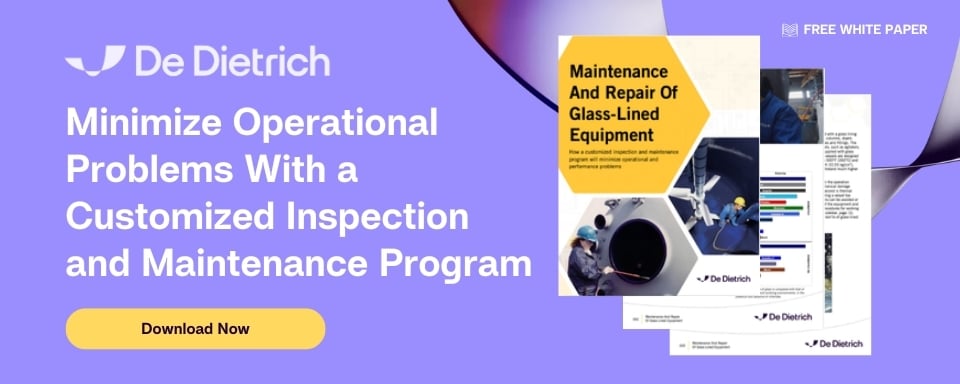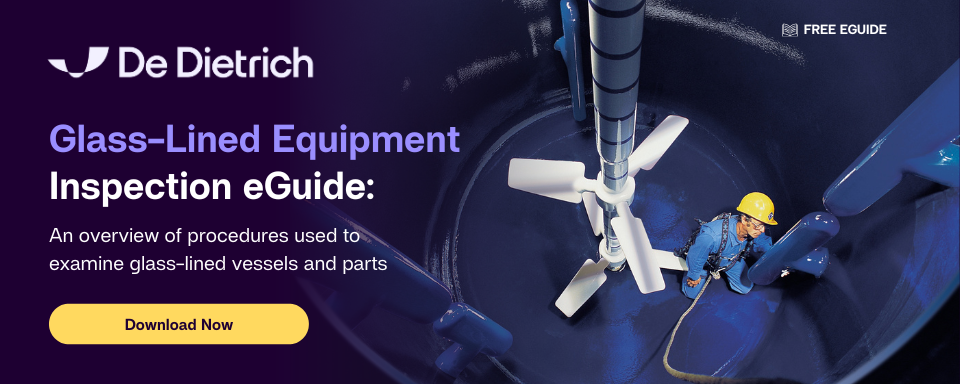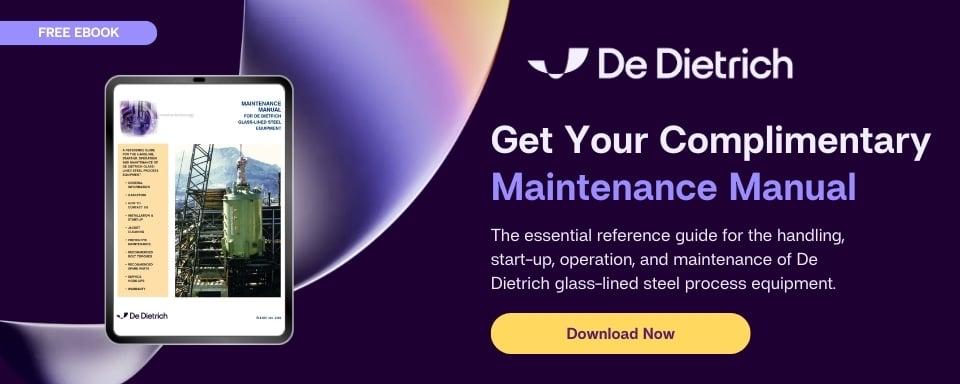Q&A with De Dietrich's Service Department

Even the best made equipment needs to be maintained and serviced periodically to ensure it is running at optimal efficiency. We sat down with Mark Banfield, Field Service Manager at De Dietrich, to get some insights on the service side of the business. While many of the answers relate specifically to DDPS, there is a lot of general information that can be applied to all glass-lined equipment and process systems.
Q: What different types of services do you offer for the various product lines you support?
A: Our service portfolio covers the four major product lines we manufacture and sell. It is important to note, however, that we can service virtually all brands of equipment that fall under these product ranges and can provide the correct parts, when necessary, to perform the service.
- With respect to (De Dietrich) glass-lined equipment we offer repair, installation and start-up assistance. We also stock a variety of replacement and spare parts to provide fast delivery and service to help keep customers facilities running with minimum downtime.
- For (Rosenmund) filtration and drying equipment we offer preventative maintenance repair and installation service plus we perform on site FAT’s (Factory Acceptance Tests).
- Installation and start-up support is available for (QVF) glass systems and components, plus general “how to” for operation and maintenance.
- We offer start-up support and on-site training for the operation and maintenance of our powder handling system, Powder Pump.
Q: What is the most preventable issue that you often get contacted about?
A: Edge chipping is probably the most common issue we get contacted about that is preventable and can be avoided with proper care. The best way to prevent edge chipping is to always use the proper torque on all flanged connections. Also since edge chipping starts from the exterior (the outer edge of the glass lining where the carbon steel starts), always coat the exterior surfaces with a corrosion resistant coating (Epoxy or vinyl ester type). DDPS is in the development stages of such a coating that our service techs will have on hand in their service vans.
Q: What is the most important thing a customer should do to help extend the life of their glass-lined equipment?
A: Common sense is the number one thing. We like to say, “If you don’t know, stop and ask”. A little extra time in the beginning can save a lot of money in the end. We’ve seen serious and costly damage to vessels and other equipment that could have been avoided if proper care was followed.
Q: How often do you suggest a glass-lined vessel be inspected?
A: Inspection of glass lined equipment is recommended every 6 months. We know this is impossible in most cases so once per year is a good rule of thumb for vessels with no repairs.
Q: What parts usually experience the most wear and tear and require service/replacement?
A: The envelope gasket is one of the most important components on glass lined equipment. It gets the most abuse due to improper installation and/or being used repetitively. The envelope gasket is the shock absorber for the glass-lined equipment and should not be reused after disassembly.
Q: Are there any specific operating methods that make equipment more susceptible to wear and tear?
A: Running the agitator blades through the liquid level, which causes skipping and can lead to cavitation, is one of the most common practices performed while operating glass lined equipment. If this is a necessary practice then reducing the agitator speed by 50% will lessen the risk for damage occurring.
Q: What is a preventative maintenance program and how does it work? What are the benefits of having one?
A: A Preventative Maintenance (PM) program is a way to monitor and document how your reactor system is operating. Using a PM will let you see any changes in the system and allow for adjustments and predict when to perform certain maintenance operations (oil change, determine glass erosion/corrosion rate, seal life, etc.).
Q: What is the usual time frame and protocol between receiving a request for service and having a technician on site?
A: DDPS Field Service has six technicians located throughout North America that can be on site within 48 hours from the initial contact with our main office.
Q: Is there anything a customer should do to prepare for a service visit?
A: Once a service visit has been scheduled, it is the customer’s responsibility to have the vessel clean and dry in addition to having it ready for confined space entry.
Q: Do you offer training to help customers learn how to perform certain services themselves?
A: DDPS offers onsite and factory training for a variety of services and minor repairs. We also do on site seminars on topics such as “Do’s and Don’ts for operating and handling of glass lined equipment” and other subjects that can be selected based on the interest of the seminar attendees. All of the information in the seminars applies to glass-lined steel equipment in general, regardless of the manufacturer.
Q: What’s the best way for customers to contact DDPS with service-related questions or to schedule a service?
A: The best way to contact our field service group it to call our main number (908)-317-2585. You can also fill out a service request form on our website and we will contact you upon receiving your inquiry.
Do you have additional service questions that weren’t answered in this post? Send us your comments and let us know – we’d love to hear from you.


